| "Mrs. Bennet... was a woman of mean understanding, little information, and uncertain temper." -- Jane Austen describing Mrs. Bennet in Pride and Prejudice |
In the previous posts, we have looked at the way novelists of Austen's day wrote about the natural dispositions and innate intelligence (or lack thereof) of their characters. Of course, merely being blessed with intelligence, aka "a good understanding," was not sufficient. That understanding had to be enriched and cultivated with knowledge, or “information.”
- In Pride & Prejudice, Mrs. Bennet has "little information." She's narrow-minded and ignorant.
- Elizabeth Bennet lists Darcy's "information" as one of his attractive attributes: "She began now to comprehend that he was exactly the man who, in disposition and talents, would most suit her. His understanding and temper, though unlike her own, would have answered all her wishes... and from his judgement, information, and knowledge of the world, she must have received benefit of greater importance."
- Fanny Price's father "did not want abilities but he had no curiosity, and no information beyond his profession; he read only the newspaper and the navy-list; he talked only of the dockyard."
- Henry and Mary Crawford are intelligent and well-educated, as Austen makes clear. Mary quotes poetry and invents a satire of that poetry on the spot. Henry converses knowledgably about Shakespeare and even how best to conduct a church service, "shewing it to be a subject on which he had thought before, and thought with judgment." Mary and Henry are lacking, however, in moral judgement, a topic we'll turn to later in this series.
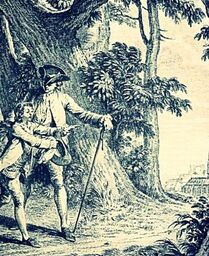 Rousseau's Emile, learning from nature
Rousseau's Emile, learning from nature - In Ashton Priory, (1792) “Eliza is endowed with a good natural understanding… but… from the character of her parents…. it can have derived no advantages from cultivation…”
- In Albert, or the Wilds of Strathnavern, “Frederick and Gertrude St. Austyn joined to good persons understandings which, had they been properly cultivated, might have proved an honour to society; but the follies of their parents slurred the fair tablets which nature had rendered capable of receiving the noblest impression.”
- In Fanny, or the Deserted Daughter (1792), Fanny Vincent vainly attempts to be an effective governess for a spoilt girl: "Sophy Wigstead was not yet twelve; she was pretty, but was so much neglected that no other judgment could be formed of her; neglected indeed only as to her mind, for the ornaments of her person were peculiarly studied..."
- In The Brothers, a Novel for Children, (1794) the author contrasts George, “who did not want natural understanding, though it was lost in idleness and neglect” with his brother Harry who “cultivate[s] that understanding which nature had given him.”
Colonel Lorton, the father in Emily, a Moral Tale [1809], thinks that is so much hogwash: “He thought that Rousseau’s plan of education, founded as it is upon no good principle, can be conducive to no good end. It shows great ignorance of human nature, because it is evident if a child is left to the unrestrained exercise of its own caprice and passions, it is likely to be more wild and mischievous than any other young animal... [he rejected] without hesitation all such fanciful schemes of education, [and] considered moral discipline as essentially conducive to the right conduct of the human mind…”
It seems Jane Austen also disagrees with Rousseau. When Catherine Morland refers to lessons as "a torment," Henry Tilney responds: “That little boys and girls should be tormented, is what no one at all acquainted with human nature in a civilized state can deny.”
He acknowledges that learning how to read is a boring and laborious task, but “it is very well worth-while to be tormented for two or three years of one’s life, for the sake of being able to read all the rest of it.”
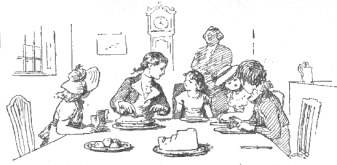 Edward Austen treated his sisters to lunch at an inn when they were at boarding school
Edward Austen treated his sisters to lunch at an inn when they were at boarding school Boys usually acquired their education at boarding schools, or occasionally with a tutor, as Edward Ferrars does in Sense and Sensibility. When Austen says "the young people were all at home" when young Fanny first came to Mansfield Park, she means that Fanny arrived during school holidays, when the teen-age Tom and Edmund were not away at school.
Emma is glad that the Westons have a daughter because: “It would be a great comfort to Mr. Weston… to have his fireside enlivened by the sports and the nonsense, the freaks and the fancies of a child never banished from home.”
Of course, girls sometimes did go to boarding schools, including Cassandra and Jane Austen.
- In I’ll Consider Of It, a grandfather disputes with his daughter over the education of his granddaughter Emily: “this was a point they never could agree upon—he hated all boarding-schools; but was particularly averse to his grand-daughter being kept any longer, now she was grown a fine tall girl, in a place where he declared she would now learn nothing but deceit and vanity, without any kind of domestic economy.”
- In The Advantages of Education, the mother rescues her daughter from just such a fashionable boarding school and commences her upon a solid course of reading and moral reflection.
- In Middlemarch, set in the 1830s, Rosamond Vincy learns how to get in and out of a carriage elegantly at her boarding school. More about “accomplishments” in another post.
"So much mischief may be done by a silly governess in a single quarter of an hour!” exclaims the narrator in Maria Edgeworth's short story, Madame Panache. Well, the governess is French, so what can you expect?
In I'll Consider of It, Miss Clarkson's grandfather's friend advises against hiring a French governess.
| “And do not all young girls show a predilection for reading novels and romances? therefore, to form the mind of her pupil, Madame [the hypothetical French governess] will very good-naturedly, procure for her all the love-breathing, unshackled romances which France has produced; from the Eloise of Rousseau, to the Delphine of Madame de Stael and perhaps will not scruple to put into her hands the more loose and easy writings of the licentious and immoral Louvet!” “Horrible!” exclaimed the Captain. [the grandfather] “And yet,” said the Major, “the picture is not too highly coloured; would to Heaven it were! But such are the beings to whom the education of children belonging to the first people in the land is entrusted.” |
“I don’t approve of the present system, of making prattling philosophers in petticoats.” [says Mr. Ogilvy] I see no good that is to result to society from having our wives or daughters discharging electric or Galvanic batteries at our heads, or of converting our cookmaids into chemical analysers of smoke and steam.”
“But are not the scientific pursuits of the present day at least as beneficial to society as the old amusements of working carpets and chair bottoms?” doctor Hoare asks, but he is just kidding. He concurs that “it is impossible there should be a difference of opinion” on the subject of females studying the sciences.
The wealthy Bertram family hire Miss Lee to educate Maria and Julia. The Bertram girls have the advantage of "early information." (If not moral instruction), and they are proud of the education they have acquired.
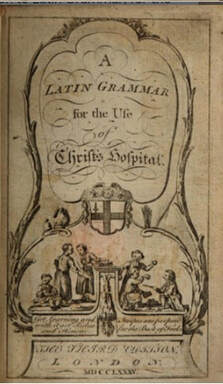
Studying Latin and Greek was controversial for women. In Coelebs in Search of a Wife, it accidentally slips out that Lucilla, the candidate for wifehood, has been studying Latin. She blushes and leaves the room. Her father Mr. Stanley approves of her modesty, for “a discreet woman will never produce in company” her knowledge of “a learned language” as opposed to “those acquirements which are always in exhibition” such as music and drawing.
Ladies who made it known they could speak Latin and Greek were derided as female pedants. For boys, however, education in those days strongly emphasized Latin. Our Austen heroes with the possible exception of Captain Wentworth (who might have gone to sea as a boy, not to university) would have been able to read Latin and to quote and refer to classical literature in Latin. Our clergyman heroes, Edmund Bertram, Edward Ferrars, and Henry Tilney, would have also studied Greek.
Of course, not everybody profited by their classical education. We can't imagine Mr. Rushworth quoting Cicero. The long-standing joke was that the sum total of classical knowledge schoolboys took away was the answer to the question, "Who dragged whom around the wall of what?"
Because Jane Austen's father kept a small school in his home, I feel certain young Jane would have overheard the lessons which were probably held six mornings a week. She would have heard the daily rhythmic chanting of the boys construing their Latin grammar.
Dr. Helena Kelly points out that Austen "certainly knew a little Latin. One of the notebooks in which her youthful writing is preserved is inscribed, in Latin, “Ex doni mei patris” (Given to me by my father), and she includes Latin phrases in her letters on more than one occasion."
However, Austen disclaimed all knowledge of the higher branches of education when she turned down a suggestion that she write a serious novel about a clergyman: "Such a man's conversation must at times be on subjects of science and philosophy, of which I know nothing; or at least be occasionally abundant in quotations and allusions which a woman who, like me, knows only her own mother-tongue, and has read little in that, would be totally without the power of giving. A classical education, or at any rate a very extensive acquaintance with English literature, ancient and modern, appears to me quite indispensable for the person who would do any justice to your clergyman; and I think I may boast myself to be, with all possible vanity, the most unlearned and uninformed female who ever dared to be an authoress."
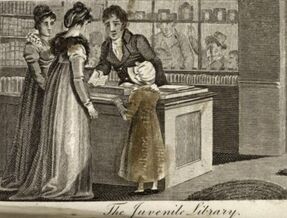
The Regency period saw many books published for home educational use. Mary Shelley's father, the philosopher William Godwin, operated a publishing business and bookstore with his second wife, specializing in juvenile literature such as Charles and Mary Lamb's Tales from Shakespeare. Moralizing novels, some of which are quoted in this series, were judged safer for children than fantasies and fairy tales. In Traits of Nature, Young Christina Cleveland remarks to her cousin Adela, "fairy-tales are forbidden pleasures in all modern school-rooms. Mrs. Barbauld, and Mrs. Trimmer, and Miss Edgeworth, and a hundred others, have written good books for children, which have thrown poor Mother Goose, and the Arabian Nights, quite out of favour;—at least, with papas and mamas."
| “'I have not been idle, if I must speak the truth,' [says Amelia]. 'One has so many things to learn, you know. I have gone on with my French and Italian of course, and I am beginning German. Then comes my drawing-master; he teaches me to paint flowers and shells, and to draw ruins and buildings, and to take views.' [She adds that he “begins” projects for her, which will then be passed off as her own work, of course.] 'And then,' pursued the young prattle, 'I learn varnishing, and gilding, and japaning. And next winter I shall learn modelling, and etching, and mezzotinto and aquatints…Then I have a dancing-master, who teaches me the Scotch and Irish steps, and another who teachers me attitudes, and I shall soon learn the waltz… Then I have a singing-master, and another who teaches me the harp, and another for the piano-forte. And what little time I can spare from these principal things, I give by odd minutes to ancient and modern history, and geography, and astronomy, and grammar, and botany. Then I attend lectures on chemistry, and experimental philosophy, for as I am not yet come out, I have not much to do in the evening… as soon as I come out, I shall give it all up, except music and dancing.' All this time Lucilla sat listening with a smile, behind the complacency of which she tried to conceal her astonishment.” This leads us, of course, to a discussion of "accomplishments." |
| Jane Austen and her contemporaries also used the word "information" as we use it today. "Miss Bertram could now speak with decided information of what she had known nothing about when Mr. Rushworth had asked her opinion; and her spirits were in as happy a flutter as vanity and pride could furnish, when they drove up to the spacious stone steps before the principal entrance." Jean-Jacques Rousseau may hold an important place in the history of pedagogical theory, but he himself had no experience with children. As Paul Johnson relates in Intellectuals, "it comes as a sickening shock to discover what Rousseau did to his own children." Rousseau abandoned each of his five children by his common-law wife at a foundling home, where he knew they would most likely die of malnutrition, disease or neglect. "How could I achieve the tranquility of mind necessary for my work, [if] my garret [were] filled with domestic cares and the noise of children?" Fanny Price's brother John and his friend Prudence pay a visit to the Juvenile Library in A Different Kind of Woman, the third volume of my Mansfield Trilogy. Click here for more about my novels. |
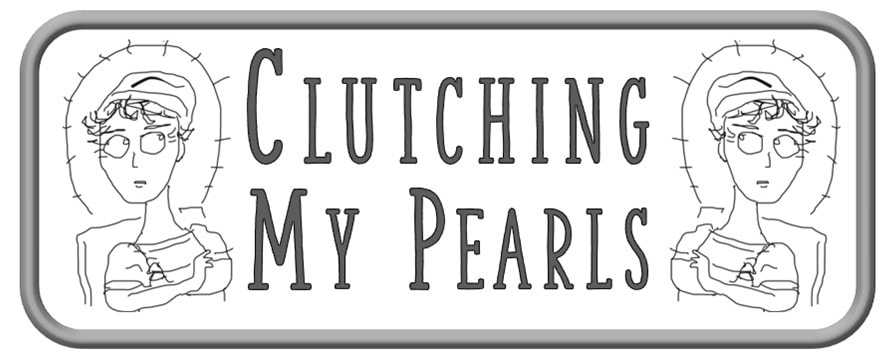
 RSS Feed
RSS Feed